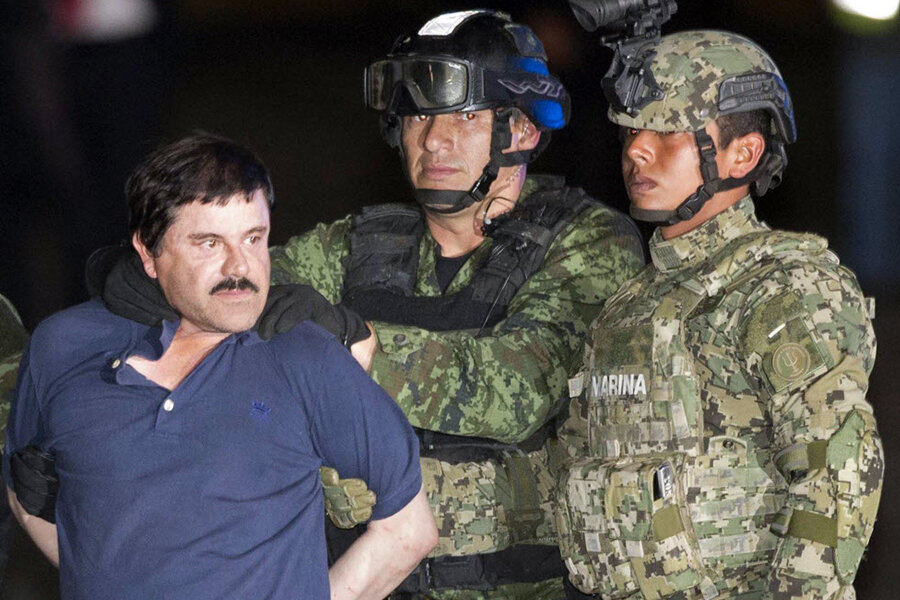Why now does 'El Chapo' want to be extradited to the US?
Loading...
| Mexico City
Drug lord Joaquin "El Chapo" Guzman is willing to plead guilty to any charges in the United States if US authorities promise him a short sentence in a medium-security prison, one of his lawyers said Wednesday.
Mr. Guzman wants to accelerate the extradition process so he can escape harsh conditions in a Mexican maximum-security prison, where guards will not let his client sleep, lawyer Jose Refugio Rodriguez said.
Mr. Rodriguez said that he and Guzman's family are reviewing options for a US defense attorney.
"We have talked about a proposal ... to plead guilty to the charges in the United States without questioning their veracity," said Rodriguez, who heads Guzman's legal team.
"That in exchange for a reduction in the applicable sentence like others have done in these situations, but also look for a medium-security prison so that he's not in the conditions that he has here," he said, calling the decision "an act of desperation" because Guzman had "reached his limit."
But talk of a possible deal is very premature and shows a lack of understanding of the US judicial process, said David Weinstein, a former federal prosecutor who oversaw the narcotics division at the US attorney's office in Miami.
Mr. Weinstein noted that neither the Justice nor the State departments negotiate with fugitives or other wanted people who are not on US soil, so any discussions could take place only following extradition. Even if Guzman were to cooperate with US prosecutors, a judge would have the final say on sentencing while prison authorities would decide where he does his time.
"You can't negotiate with the Bureau of Prisons," Weinstein said. "Of all the governmental entities in the United States, they are the least flexible. Even judges can't tell them what to do with regard to placement."
Moreover, Guzman, who is considered the leader of the Sinaloa cartel, faces charges from not one but seven different US attorneys' offices, in cities including Chicago, New York, Miami, and San Diego among others, and authorities have not said which one will get the first crack at him.
So at this point there is no one to negotiate a plea deal. And it's highly unlikely that anyone in the United States would do so before Guzman set foot in a US courtroom.
The US Embassy in Mexico City said Wednesday it does not comment on pending extradition cases. In Washington, Justice Department spokesman Peter Carr also declined to comment.
Some Mexican drug suspects have reached plea deals with US authorities in the past, but it is not clear that any have ever been able to negotiate terms on where they will be held.
Guzman's lawyers had previously vowed to fight extradition as long as possible, and Mexican officials said it could take at least a year for the process to work its way through their courts.
But Rodriguez suggested it could be done in two months, presumably if Guzman withdrew the estimated nine appeals his lawyers filed.
However, Rodriguez added, "We won't drop the (legal) defense in Mexico until we have an agreement with the United States."
Officials have acknowledged that guards at the Altilplano prison wake Guzman every four hours for a head count. He escaped the same prison in July and was recaptured in January.
The harsher regime – Guzman also has fewer visits than during his last stint in prison – seems to have broken him.
"I saw a defeated, humiliated man," Rodriguez said.
In February, Rodriguez gave The Associated Press a copy of Guzman's testimony in one of the cases against him. In it, Guzman accused prison authorities of torturing him by constantly waking him up, and said, "I feel like a sleepwalker."
"My head and my ears always hurt and I feel bad all over," he said in the document.
The testimony also sheds light on the relatively permissive visitors' schedule Guzman enjoyed before his escape, now significantly reduced.
Guzman said previously he got an hour-and-a-half every day to talk to his lawyer and an hour outdoors in a prison patio. Every nine days, he was allowed a four-hour conjugal visit and a four-hour family visit.
National security commissioner Renato Sales, whose responsibilities include overseeing federal prisons, said at a news conference Monday that Guzman's human rights were in no way being violated and pointed out that "El Chapo" has escaped twice from Mexican lockups.
"Shouldn't someone who twice escaped from maximum-security prisons be subject to special security measures?" Mr. Sales said. "The common sense answer is yes."





